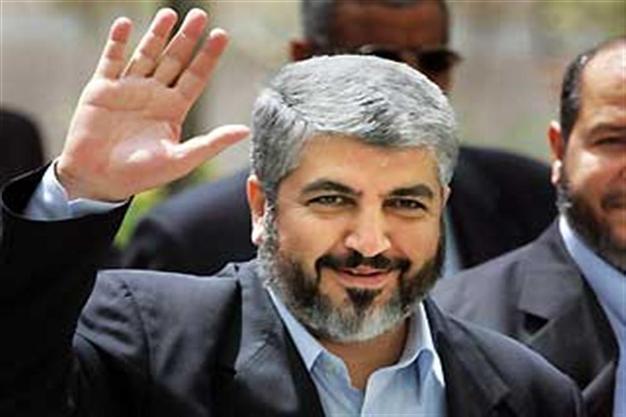Hamas re-elects Meshaal as leader: official
GAZA CITY, Palestinian Territories - Agence France-Presse

Re-elected Hamas leader Khaled Meshaal. Hürriyet photo
Veteran Hamas leader Khaled Meshaal was elected for a new term as head of the Palestinian Islamist movement, a party official said on Monday.
There had been speculation that Meshaal, who is based in exile, would be forced aside by the movement's powerful leaders in the Gaza Strip, which it has controlled since 2007.
Meshaal himself had said last year that he would not seek a new term.
But a Hamas official said that the party's governing shura council re-elected him for another four years at a meeting in Cairo late on Monday.
"The leaders of Hamas chose Meshaal," the high-ranking official told AFP via telephone from the Egyptian capital, requesting anonymity.
Another Hamas official, also speaking on condition of anonymity, said earlier Monday: "The elections take place in total secrecy, but it's widely known that Meshaal's term will be renewed." Hamas officials were in Cairo on Sunday and Monday for the vote, and to discuss with Egyptian leaders reconciliation with the rival Fatah faction of Palestinian president Mahmud Abbas.
Meshaal will be aided by Gaza's Hamas prime minister Ismail Haniya, who heads the movement internally in the Palestinian territory, and the movement's number two Mussa Abu Marzuq, responsible for the exiled section of Hamas.
Haniya was also in Cairo for talks with Egyptian officials.
Hamas-Egypt relationsTies between Hamas and Cairo have been tense after Egyptian forces closed down dozens of smuggling tunnels on the Gaza border.
Haniya seeking to "clear the air" after Egyptian allegations of Hamas involvement in a deadly attack on Egyptian soldiers in the Sinai Peninsula last year, Hamas sources said.
Abu Marzuq would have been favoured for leadership had Meshaal not run for another term.
A brilliant orator, Meshaal has used the freedom of movement that is denied to Hamas leaders in Gaza to criss-cross the Arab and Muslim world.
Developments in the Middle East since the Arab Spring uprisings of 2011 "pushed Hamas to choose Meshaal... who has given the movement a national face... and has good relations in the Arab world," a third Hamas official said Monday.
It was only last December that Meshaal made his first ever visit to Gaza.
He was propelled to the movement's leadership in 2004 after Israel assassinated the movement's founding leader Sheikh Ahmed Yassin and his successor Abdelaziz al-Rantissi in the Gaza Strip.
Meshaal survives assassination attemptMeshaal himself survived an Israeli assassination attempt in Jordan in 1997 when agents of the Mossad secret service disguised as Canadian tourists bungled an attempt to poison him on a street in Amman.
Three of the attackers took refuge at the Israeli embassy, but two were captured by Jordanian authorities.
Meshaal fell into a coma and a furious King Hussein demanded Israel hand over the antidote if it wanted the captured agents to be freed.
The episode compelled then Israeli prime minister Benjamin Netanyahu -- re-elected in 2009 and again this year -- to release Yassin and 19 others from prison.
After Hamas won a landslide victory in a January 2006 Palestinian general election, the West mounted a boycott of the movement.
Bickering with the Fatah party of president Mahmud Abbas culminated in the formation of a unity government in 2007 but that collapsed in bloody street fighting in Gaza only months later.
Hamas militants seized control of Gaza, routing forces loyal to Abbas and undermining the power of the Palestinian Authority, with Hamas members hunted down in the West Bank in retaliation.
Fatah and Hamas signed an Egypt-mediated reconciliation agreement on April 27, 2011 in Cairo.
But most of its clauses went unheeded and deadlines were constantly postponed.
The two sides responded positively to a proposal by Qatar at an Arab League summit late March for a mini-summit aimed at Palestinian reconciliation.
